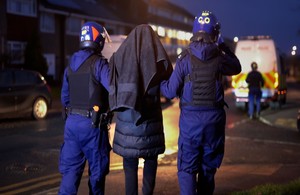Thousands more arrested in nationwide crack down on county lines
New figures demonstrate the impact of coordinated and relentless police action in tackling county lines drug gangs

Metropolitan Police Service county lines operation
County lines drug gangs continue to be shut down at pace across England and Wales, as new figures today (Thursday 9 March) demonstrate the impact of coordinated and relentless police action.
New figures reveal that since the government launched its County Lines Programme in 2019, police have shut down 3,588 drug lines. In the last year alone, over 1,000 lines have already been closed, meaning the government is on track to surpass its target to close 2,000 lines over 3 years.
And last week, police forces across the country arrested an additional 1,658 criminals and seized 31kg of Class A drugs and 404 dangerous weapons, as part of a nationwide week of intensive action:
- 1,658 people were arrested
- 276 drug lines were identified and seized, 68% more than last Intensification Week
- Over £2 million in cash seized
- 404 weapons seized, including 288 bladed weapons and firearms such as handguns and shotguns.
Crime and Policing Minister Chris Philp said:
County lines gangs run vile, exploitative criminal operations manipulating the most vulnerable to do their dirty work, and tearing families and communities apart in the process.
We cannot and will not stop wiping them out and I am thankful for the tireless police work conducted last week and every week, in ridding our streets of these criminals.
Head of The National County Lines Coordination Centre, Detective Superintendent Neil Ballard said:
This intense week of operational and partnership activity has been incredibly successful in closing 276 deal lines across England, Scotland and Wales. All Forces have worked collaboratively to target the controllers of the County Lines, making 1,658 arrests in one week, and seizing the proceeds of their criminality, including over £2M cash.
County lines exploit children and vulnerable adults and safeguarding has been at the heart of our response, with 78 vulnerable people being referred to support services via the National Referral Mechanism, and Police Forces delivering programmes of engagement within schools and working with partners such as The Children’s Society on the #Lookcloser campaign.
County lines is a criminal business model, evidenced by the full range of drug types seized during this week, but they are also strongly associated with violence as demonstrated by the seizure of over 400 weapons this week, including 288 bladed weapons and firearms such as handguns, shotguns and a silencer.
The policing response to county lines criminality has never been stronger and we will continue targeting this abhorrent threat in our communities to make our streets safer.
New Home Office figures also show that 1,108 county lines have been closed since April 2022, following the government’s commitment in its Drugs Strategy to close an additional 2,000 lines by March 2025.
Since its launch in 2019, police activity funded by the County Lines Programme has resulted in:
- 3,588 county lines closed
- 10,209 people arrested
- 5,727 people referred for safeguarding.
The Crime and Policing Minister, Chris Philp, is visiting Liverpool today to see how Merseyside Police – one of the priority forces in the County Lines Programme – is using a multi-agency approach to disrupt gangs running drugs in and out of the city.
The Minister will see Operation Overlord in action, which targets key transport hubs to smother supply routes utilised by Organised Crime Gangs, including through the rail and coach networks.
The Minister is also visiting Catch 22, one of the specialist victim support projects for under 25s funded by the Home Office.
Services provided by Catch 22 include:
- a rescue service for young people found far from their home
- a one-to-one specialist support service that safely makes contact with young people who have been referred by safeguarding partners, such as the police and children’s services, and works with them to end their involvement in county lines activity
- specialist caseworkers for mental health and women and girls.